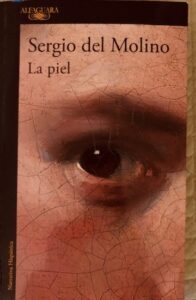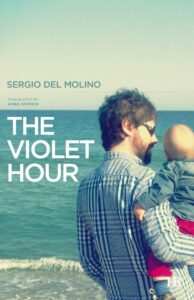No matter how carefully I read every morning El País, the Spanish newspaper, and how attentively I listen to the suggestions of my colleagues on both sides of the Atlantic, it seems that I am forever playing catch up with the publications of new Spanish authors. It’s the same with films; the Goyas (the Spanish version of the Oscars) are this coming weekend and, despite the myriad of streaming platforms, I’m way behind the game.
Not surprising then, when in the last issue of The New York Review of Books, I read Aaron Timms’ extensive article about a book, Skin, by Sergio del Molino (Madrid, 1979) translated by Thomas Bunstead. To make matters worse, even when I had read another book by this author, La mirada de los peces, 2017 (“How Fish See,” my translation) in my Spanish Book Club, La piel (2020) had completely slipped under my radar. Thanks to pervasive Amazon, I was voraciously reading the original version in Spanish in a couple of days.
La piel / Skin is a powerful book of creative non-fiction about the impact that psoriasis had in the life of the author. Sergio Del Molino was diagnosed with this chronic illness when he was twenty years of age and suffered multiple flare-ups, despite all possible treatments until a new medication has recently made his life livable. Some of the chapters tell the stories of other people who have agonized with the same disease: Joseph Stalin, John Updike, Vladimir Nabokov, Cyndi Lauper, Pablo Escobar…Who knew?
Sergio Del Molino was diagnosed with this chronic illness when he was twenty years of age and suffered multiple flare-ups, despite all possible treatments until a new medication has recently made his life livable. Some of the chapters tell the stories of other people who have agonized with the same disease: Joseph Stalin, John Updike, Vladimir Nabokov, Cyndi Lauper, Pablo Escobar…Who knew?
As thought-provoking as these chapters are, including one about the relationship between racism and the color of everyone’s skin, what fascinated me where the other chapters addressed to Del Molino’s son, seven-year-old Daniel, starting with the classical “Once upon a time…” The author’s playful relationship with his son shows an unusual tenderness and creativity. Every night, he puts him to bed and reads him a chapter of a book by Roald Dahl; he worries about the time when his son won’t want to hug him, kiss him or hold his hand as they walk together. At this point I was watching the Eagles football game with the TV on mute as to not be distracted, but suddenly I saw the fireworks in the distance, over the stadium, and I knew they had won the National Football League. Only in America!
Half way through the book, it became obvious that Del Molino had lost a son, and I went back to inescapable Amazon and ordered on Kindle another book of his I had missed, La hora violeta, 2013 (The Violet Hour, which has been translated into English, Italian and French). I didn’t want to wait whatever few days it would take to arrive in hard copy. At this point, I found myself in a situation I try to avoid, reading two different books by the same author at the same time. My good sleeping hygiene dictates that I avoid bright screens before bedtime.
 La hora violeta tells the story of Pablo, Del Molino’s first-born son’s death from leukemia before he was two-years-old. This book is one of the most beautiful, despite its sadness, I have ever read. In many ways, it elucidates the paternal feelings the author demonstrated in Skin, while it’s also part of a controversy in any language. Memoirists like myself argue whether the death of a loved one should be inspiration for a literary work. As Sergio Del Molino said in La hora violeta: “One could think that, once these experiences are reduced to pen and paper, they would clean my soul or purge my feelings. Writing this story doesn’t advocate for hope or desperation. Rather, it is the narrative of an inexorable fact” (my translation).
La hora violeta tells the story of Pablo, Del Molino’s first-born son’s death from leukemia before he was two-years-old. This book is one of the most beautiful, despite its sadness, I have ever read. In many ways, it elucidates the paternal feelings the author demonstrated in Skin, while it’s also part of a controversy in any language. Memoirists like myself argue whether the death of a loved one should be inspiration for a literary work. As Sergio Del Molino said in La hora violeta: “One could think that, once these experiences are reduced to pen and paper, they would clean my soul or purge my feelings. Writing this story doesn’t advocate for hope or desperation. Rather, it is the narrative of an inexorable fact” (my translation).
In my modest opinion, one of Isabel Allende’s best books is Paula (1994) about the premature death of her daughter. Likewise, Joan Didion’s The Year of Magical Thinking (2005) and Blue Nights (2011) about her husband’s and daughter’s deaths respectively are masterpieces. While Joyce Carol Oates memoir, A Widow’s Story (2011), is one of my least favorites. I remember listening to her at the Philadelphia Public Library; perhaps it was so difficult to sympathize with her, although I had lost my own husband a short time earlier, because her new husband was standing behind the curtains while she was on stage, whining about having to put the trash out after her husband’s death. But I digress.
There are many more titles to confirm and contradict my point. Suffice it to say that, despite their grave and distressing themes, La hora violeta and La piel are two stimulating books. What matters as much as the story itself, is the way it’s told.

Concha,
I really enjoyed this piece. Mary
Thanks so much! Concha
Hi Concha!
I love this post and overall, your “voice” as a writer. You write with clarity and warmth. It is a conversation that you are having with your readers. Thanks for sharing this with me!
This is so nice to hear, Randi. I’m just trying to be myself, honest and vulnerable. It’s a good
feeling to be supported by readers, and writers, like yourself, Concha
We are off to Antarctica today and I will definitely download these 2 books! Look forward to seeing you on our return!
Go Eagles!!
XO
Joan Rollins Tropp
Have a wonderful trip! I want to hear all about it when you get back, Concha
Querida, tus escritos me sirven de “tarea”… todavía intento ponerme al día con las películas que comentabas en el epílogo anterior, y ahora a leer se ha dicho.
No estoy muy al día con los escritores actuales porque me cuesta mucho leer.
Gracias, en cualquier caso, por las reseñas y las recomendaciones.
XXX, Cristina
¡Ay, no, no es tarea. Es puro placer! Concha